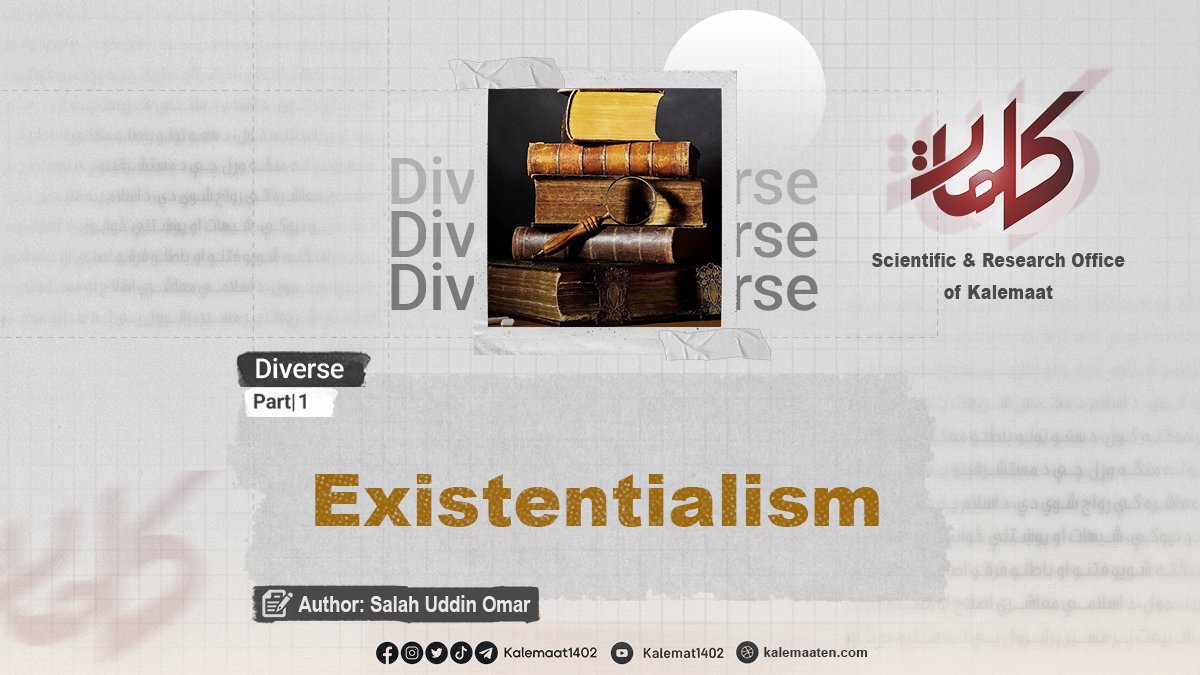Author: Salah Uddin Omar
Existentialism (Part One)
Critique of the Philosophical Foundations of Existentialism and an Examination of Its Social Consequences from the Perspective of Islam
Preface
In this article, I address the fundamental conflict between existentialist philosophy; particularly its atheistic branch and the purpose-oriented Islamic worldview. Existentialism presents the human being as a creature without any predetermined essence, condemned to absolute freedom, and trapped in fundamental anxiety and existential absurdity within the world.
In Islamic law, human freedom is purposeful; vicegerency and servitude possess inherent meaning and responsibility. Islam provides the purpose of creation (worship) as the pre-established meaning of existence, and remembrance of Allah and connection to Him (tranquility) replace existential anxiety.
In the end, we conclude that the consequences of this school of thought—such as the promotion of individual isolation, moral relativism, and the collapse of life’s meaning—stand in direct contradiction to divine commandments. Only a return to the divine Shari‘ah and servitude to God can deliver societies from the crises created by existentialism and any other human-constructed ideological system.
Keywords: existentialism, freedom, Islamic anthropology, absurdity, Islam, servitude.
Introduction
Existentialism, (being-oriented philosophy), is one of the most influential philosophical schools of the twentieth century and continues to be regarded as an intellectual response to the crisis of meaning that emerged in the nineteenth and twentieth-century modernity. It seeks to redefine the place of the human being in a world stripped of metaphysical certainties.
Philosophers such as Kierkegaard, Nietzsche, Sartre, and Heidegger each, in their own way, emphasized human freedom, choice, and existential anxiety. At the same time, this school, by denying any fixed essence or inherent nature, views the human being as a creature who must construct his own meaning and identity. Such a perspective, at its core, leads to a form of severance from God and from absolute divine values.
According to this view, the human being is first “thrown” into this world without any predetermined purpose or essence. Throughout his life, he must construct his own nature and meaning through free choices, without any divine guidance or fixed moral framework. [1]
In this article, while explaining the basic concepts of existentialism, we also offer a fundamental critique of this school from the perspective of Islam. We will examine its profound and destructive consequences for society and for the spirit of the modern human, in contrast to the ethical system and the divine Shari‘ah of Islam.
Roots of the Crisis in Existentialism
Existentialism, in its very essence, is a desperate attempt to fill the void left by the absence of divinity in a post-theistic world. It is not a philosophy of liberation, but rather a philosophy born out of crisis and the collapse of meaning.
-
Denial of the Wisdom of the Creator
The core of existentialism is built upon the rejection of any divine intention, purpose, or plan prior to the birth of the human being. This negation transforms the human into a “thrown” creature, one who enters the world with no home, no anchor, and nothing to rely on except his temporary choices. This way of thinking is, in reality, a denial of the Creator’s wisdom and an endorsement of perpetual confusion and bewilderment as the only authentic mode of existence.
-
The Hero of Despair and Anxiety
The existentialist views himself as obligated to stand against the fundamental absurdity of existence. He is compelled to wrestle with the fear and anxiety that arise from absolute freedom. He feels the heavy burden of responsibility for all of humanity upon his shoulders—yet there exists no fixed foundation by which the correctness or incorrectness of this responsibility can be judged. [2]
-
Turning Responsibility into a Nightmare
In this school of thought, responsibility becomes a nightmare from which the human cannot escape—he is “condemned to be free.” By stripping away all divine support, existentialism pushes the individual toward a pathological individualism in which any fixed morality or social value loses authenticity. These foundations pave the way for irreligious perspectives, the adaptation of concepts such as democracy, and an aversion to implementing the political system of Islam.
To be continued…
References:
- Sartre, Jean-Paul. L’existentialisme est un humanisme (Existentialism Is a Humanism). Paris: Les Éditions Nagel, 1946, p. 20. (Reference to the principle: “Existence precedes essence.”)
- Camus, Albert. Le Mythe de Sisyphe (The Myth of Sisyphus). Paris: Gallimard, 1942, p. 11. (Reference to the concept of Absurdity, i.e., fundamental existential absurdity.)



